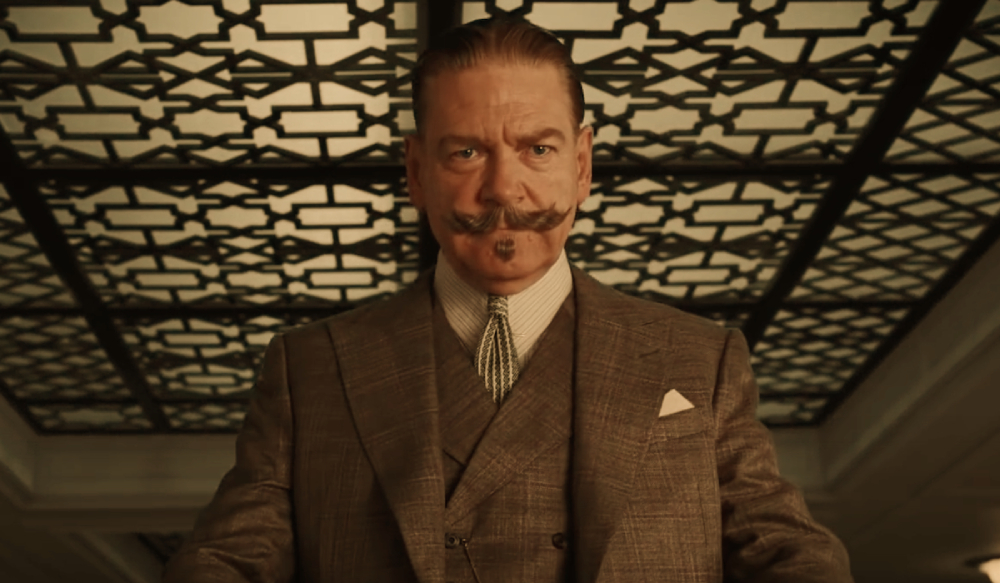
After helming Murder on the Orient Express, Kenneth Branagh’s second film based on Agatha Christie’s Poirot murder mystery series is…better. Death on the Nile doesn’t feel nearly as rigid or awkward in trying to stage a compelling and sophisticated tale of murder most foul. It’s a better shot, has better pacing, and a cast that mostly shines. It’s still far from being one of the more definitive takes on the classic story but just narrowly pushes out an enthralling picture, if not mixed in its results.
Branagh returns to the role of Poirot with a few lessons learned from the last movie. He doesn’t try too hard with the character this time, whether it’s with his obsessive nature of keeping things orderly or his comically large mustache being too large. Poirot does feel more fleshed out in this picture considering there’s less of a rush to push him into a case. We get a flashback of his time during the war, witness him having a quiet moment at a club, and even get some inklings to his romantic life that seems to be as shadowy as everything else in his past. If Branagh doesn’t exactly look the part, he at least builds up the character well, despite not having the same physical build (he really doesn’t want to go fat and bald, does he?).
Poirot’s adventures take him to Egypt to attend the wedding of Simon Doyle (Armie Hammer) and Linnet Ridgeway (Gal Gadot). The two had met at a nightclub many months ago when Simon was originally set to engage the passionate Jackie (Emma Mackey). Jackie, however, won’t let that love die and follows this couple all the way to their honeymoon cruise on the S.S. Karnak. The trip down the Nile may seem awkward with your stalking ex but it’s made even more awkward by the slew of colorful yet conspiring characters. Linnet’s godmother of Marie Van Schuyler (Jennifer Saunders) has a despisement of wealth for having just discovered communism and her nurse Mrs. Bowers (Dawn French) seems to kinda/sorta go along with it. A former lover of Linnet, Linus (Russell Brand), attends with a tight lip that he takes care to only speak when his doctor services are required. Andrew (Ali Fazal) is Linnet’s lawyer and seems awfully eager to get her to sign some papers on her honeymoon. So when Linnet turns up dead, everybody’s a suspect. And just in case Poirot seems distant from this case, his friend of Bouc (Tom Bateman) becomes involved, as well as his painting mother Euphemia (Annette Bening).
There are a few standout performances here but none are more compelling than Sophie Okonedo in the role of the jazz singer Salome Otterbourne. She dominates the screen for the few times she graces it, whether she’s singing a swinging number or being interviewed by Poirot. There’s also her daughter, played by Letitia Wright in a perfectly pensive mode considering both the untrusting nature of her mother and hoping she’ll accept her romance with Bouc.
Sadly, there are some performances that fall short. Gadot’s portrayal leaves a lot be desired for a character who has to seem both fearful and eccentric. Brand’s cautious approach to Linus is very underwhelming that he feels less suspicious and more out of place. Performances like these really make one appreciate the sexiness of Okonedo and the effortless charm of Saunders and French. They also showcase how the ensemble is more of a mixed bag. That being said, when compared to Murder on the Orient Express, I’ll gladly take a handful of strong performances than a whole batch of stuffy ones.
Death on the Nile at least looks good and has great pacing to make up for the uneven acting. It still doesn’t feel like Poirot but it certainly looks like a sophisticated Branagh movie, complete with beautiful exterior shots and clever blocking for the interiors. A good but not great attempt at Poirot, feeling more closer to Branagh’s ego than Christie’s writing.

 “Deadpool & Wolverine” Review
“Deadpool & Wolverine” Review  “The Boys: Season Four” Review
“The Boys: Season Four” Review  “The American Society of Magical Negroes” Review
“The American Society of Magical Negroes” Review  “Twisters” Review
“Twisters” Review  “Sausage Party: Foodtopia” Review
“Sausage Party: Foodtopia” Review  “Robot Dreams” Review
“Robot Dreams” Review  “Godzilla x Kong: The New Empire” Review
“Godzilla x Kong: The New Empire” Review  “Slave Play. Not a Movie. A Play.” Review
“Slave Play. Not a Movie. A Play.” Review 


